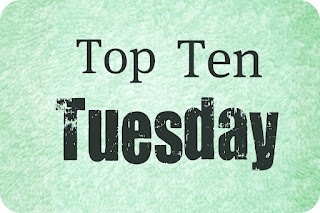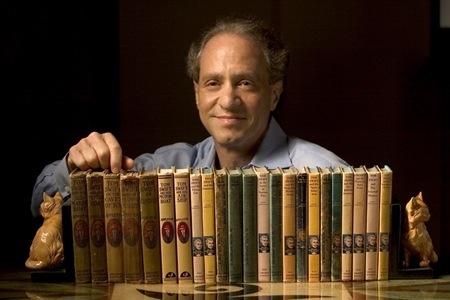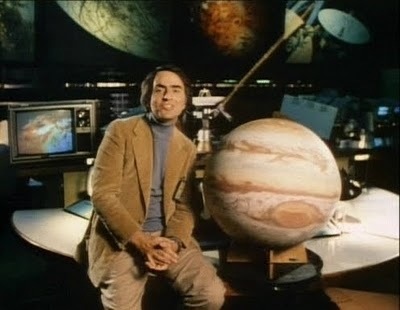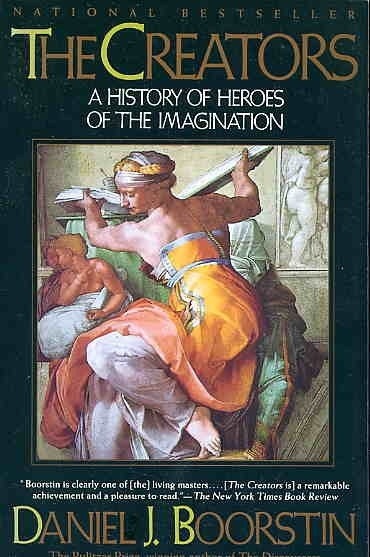Top Ten Tuesday is a weekly meme hosted by the wonderful book blog, The Broke And the Bookish. Our directions this week state: “This week’s Top Ten Tuesday lets you choose your favorite authors in a specific genre, be it sci-fi, romance, nonfiction….anything that strikes your fancy!” I chose nonfiction authors. I’ll also admit that at first I thought top ten nonfiction authors WAS the theme for everybody, since I saw that topic pop up on my Twitter feed this morning from The Avid Reader’s Musings blog. “there’s one I could do,” I thought. So here goes – and for once these actually ARE in ranking order, with #1 being my favorite.
10. Sam Kean (author of The Disappearing Spoon)
I still haven’t posted about this great book I read last year. Now he has a newer book out that I’ve also heard great things about, “The Violinist’s Thumb – and Other Lost Tales of Love, War, and Genius as Written by our Genetic Code.”‘ The book I read, The Disappearing Spoon is about tales related to the discovery and refinement of the Period Table of Elements. Fascinating Stuff!
9. Isaac Asimov (for his Guide to Shakespeare)
More known for his prowess in the sci-fi genre, Asimov was a tremendously prolific writer of non-fiction as well. I also own a book of his on astronomy and his autobiography, “I, Asimov.” It was his guide to Shakespeare, though, which influenced me the most, helping me through my “Project: Shakespeare” in 2008, where I was able to work my way through two-thirds of The Bard’s plays. Thank you, Mr. Asimov.
8. Timothy Ferris (for his “Coming of Age in The Milky Way)
One of several books that opened me up to the vast wonders and especially the history of scientific exploration. “Coming of Age…” deals for the most part with astronomy, and is now somewhat dated, but also recounts the early, stumbling growth of scientific knowledge.
7. Jonathan Rowson (primarily for “The Seven Deadly Chess Sins”)
I spent twenty-five years on “the circuit” playing chess tournaments, and Rowson’s books were the ones that I identified with the most. Rowson, though a talented grandmaster, is not the stereotypical, monomaniacal chess genius who thinks of nothing else. Though I was a serious player, I always tried to stay well-rounded too.
6. Bill Bryson (for several books)
Consistently witty, Bryson’s writing always serves as a great pick-me-up if I get into a reading rut and am bogged down with heavier material. Probably his “A Walk in the Woods” is my favorite since I’m a chronic walker and woods-wanderer too.
5. Plutarch (for his “Parallel Lives”)
A great influence on my love of history (I even became a history major in college) Plutarch’s “Lives” of the Noble Romans and Greeks have also been great influences to other historians up to the present time. (And yes, I had to get a classical author in here 🙂 Herodotus was the runner-up)
4. Benjamin Franklin (for his Autobiography)
I’ve read through this book so many times. It’s almost a manual for self-improvement. Maybe this could be considered the first “self-help” book, but it’s so much more that that classification feels insulting. Everyone should read it. This includes you. 🙂
3. Ray Kurzweil (for several different books)
My friends in the skeptical community will be rolling their eyes at this one. A famous “futurist,” Kurzweil’s books are nothing if not fascinating. His “Fantastic Voyage” explores the possibilities of technology-aided life extension while his books “The Age of Spiritual Machines” and “The Singularity is Near” deal with artificial intelligence. Irresistibly compelling topics for this reader.
(below: Ray Kurzweil, appropriately pictured with a rack of TomSwift books)
2. Carl Sagan (for ALL his books)
Sagan was a great “populizer” of science, as evidenced by his frequent appearances on Johnny Carson’s “Tonight Show” and his landmark PBS series, Cosmos. I’ve read almost all of his (mainstream anyway) books. Some favorites are Pale Blue Dot, Broca’s Brain, and The Demon Haunted World. His transparent love of learning and knowledge is highly contagious.
(below: Carl Sagan)
1. Daniel Boorstin (primarily for “The Creators” and “The Discoverers”)
It was a tough decision on who would be my #1, and Boorstin wins by a hair. His “joy of the amateur” that guided his inquiry into the history and stories that fill his books was a tremendous influence on me, allowing me to realize that one doesn’t necessarily need to channel all his focus in one direction but can pursue many interests and fields of study. “The Creators” is perhaps my favorite nonfiction book of all time.
That’s my list. Anyone else do non-fiction? I’ll be checking the roster at The Broke and The Bookish to find out…




Alex said,
October 16, 2012 at 10:24 am
I’m ashamed to say that I’ve never read a book by Sagan, although I’m a big fan and recently bought many of his documentaries in DVD (although some are outdated).
LikeLike
Jay said,
October 16, 2012 at 12:44 pm
Hi Alex,
You should correct that oversight! 🙂 I always recommend his “the Demon Haunted World” to my friends who are given to belief in the paranormal, etc. I’m not sure any of them havehad the courage to read it though.
On an unrelated note, I took my mom to breakfast yesterday and shared our “snapping beans” exchange with her. She got a kick out of it and recalled that when I was very little and was tasked with bean-snapping duty, I’d hold each snapped section out for inspection and ask “is this good?” (I was probably the least productive member of the team at that age…
-Jay
LikeLike
nzumel said,
October 16, 2012 at 4:40 pm
Mary Roach is a lot of fun (“Stiff”, her first book, and “Spook” in particular). Oliver Sacks (most everything, but his Migraine book is bit more technical and a little harder to read). Stephen Jay Gould (“The Mismeasure of Man” in particular). Daniel Levitin (“This is your Brain on Music”).
I like personal essays, too (the non-fiction equivalent of short stories, I suppose), so: Joan Didion, Truman Capote. Richard Rodriguez, James Baldwin….
That’s eight. I’ll stop.
LikeLike
Jay said,
October 16, 2012 at 10:22 pm
Thanks for your comments about other nonfiction authors, many of whom I wasn’t familiar with. I’ve read my share of Gould but just didn’t think of him when making this list. Mary Roach sounds interesting – would a skeptic like me enjoy her books?
-Jay
LikeLike
nzumel said,
October 16, 2012 at 11:57 pm
I think you might enjoy Roach. She doesn’t take a position one way or the other, she just looks at people who do. With a sense of humor, as well.
LikeLike
Jay said,
October 17, 2012 at 12:39 pm
Okay. I’ve put her on my Goodreads TBR list. That doesn’t absolutely guarantee I’ll get to it, but helps me not to forget about it. 😀
-Jay
LikeLike
Dale said,
October 16, 2012 at 7:10 pm
I saw this topic, but couldn’t come up with ten from any genre. I didn’t think of non-fiction – good idea. I have never heard of The Creators, but it looks fascinating! It’s on my list. I’ve been wanting to read The Demon Haunted World ever since it was on our bookclub’s bookshelf.
LikeLike
Jay said,
October 16, 2012 at 10:29 pm
I thought about doing my top ten short stories, but would probably have had to limit it to those read in 2012 or something, as there are just too many I really like.
One thing I liked about The Creators was that, due to its format of relatively short chapters about different people or ‘movements,’ it could be picked up and chapters read, or re-read, ‘independently’. I carried that book to work with me for several months reading a chapter here and there, often at lunch at the City Market. I was sad when it was “over” but have revisited often in the past decade.
LikeLike
tarynwanderer said,
October 17, 2012 at 9:53 am
I love non-fiction but can never seem to find books that really grab me, so I am taking notes on your TTT entry! Kurzwiel’s books in particular sound intriguing, though I’m embarrassed to admit I haven’t yet tackled Sagan or Asimov yet.
I also second nzumel’s suggestion of Mary Roach. I just read her book “Stiff,” about human cadavers and their many uses, and it was incredibly interesting (though also a little gross).
LikeLike
Jay said,
October 17, 2012 at 12:43 pm
Hi Taryn,
I always feel like I’m not reading enough non-fiction myself, but I agree it is a little harder to find titles in that genre that grab you and are “page-turners.” Kurzweil is probably not for everyone, but if you’re looking for thought-provoking reading you could do a lot worse.
As I mentioend to Nina above, I’m noting Mary Roach as ‘to read’ on my Goodreads account, so I’ll likely read her at some point.
-Jay
LikeLike
Literate Indy said,
October 17, 2012 at 9:43 pm
Great list – now I have yet another six or seven books to add to my own ever-growing list. I would also highly recommend Larry McMurtry’s trilogy of memoirs. ‘Books’ in particular. They are relatively short, and incredibly pleasant to read.
LikeLike
Jay said,
October 18, 2012 at 7:31 am
Thank you! And thanks for the recommendation re McMurtry. I’m ashamed to say I’ve never read him, not even Lonesome Dove. The Carmel Library’s “Critical Mass” book discussion group tackled it late this past summer, and I thought I might knuckle down and finally read it for that, but… I failed. I’ll mark “Books” as a ‘to read’ on Goodreads.
-Jay
LikeLike
Literate Indy said,
October 20, 2012 at 1:17 pm
You know, I’ve not read any of his fiction either. You’re right, it’s an oversight, and one I should correct, especially since I like his memoirs so much.
LikeLike
Lori Benton said,
December 8, 2012 at 12:06 pm
Most of the nonfiction I read is for novel research, most about the 18th century. This year I’ve particularly enjoyed Richard Berleth’s Bloody Mohawk. Robert Morgan has a wonderful biography on Daniel Boone, called simply Boone. In The Heart of the Sea: the Tragedy of the Whaleship Essex by Nathaniel Philbrick was a gripping read. That’s the real story that inspired Melville’s Moby Dick. Best writing craft book: Wired For Story, by Lisa Cron.
LikeLike
Jay said,
December 10, 2012 at 5:48 pm
Hi Lori,
Thanks for your comment. The Daniel Boone biography sounds great. We were just talking about him in the office friday, as someone’s daughter in school is working on some project about him. THe Philbrick book sounds good too – I think I’ve read him before but can’t remember what book.
I’ll make a note of Lisa Cron in case I ever try to write something when I retire from my day job… 🙂
-Jay
LikeLike